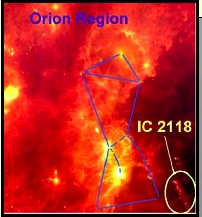Difference between revisions of "Current Research Projects"
m |
|||
| Line 13: | Line 13: | ||
Please see our [[Introduction_to_IC2118|quick introduction to IC 2118]] and [[Specific_IC_2118_information|more lengthy introduction to IC 2118]]. You may also be interested in [[Studying_Young_Stars| general information on studying young stars]]. | Please see our [[Introduction_to_IC2118|quick introduction to IC 2118]] and [[Specific_IC_2118_information|more lengthy introduction to IC 2118]]. You may also be interested in [[Studying_Young_Stars| general information on studying young stars]]. | ||
| + | =Lynds Clouds= | ||
| + | '''[[Lynds Clouds Current Research Activities | CLICK HERE for current research activities associated with this project.]]''' | ||
| + | |||
| + | This brand new (as of Jan 2008) team is getting started on observing at least one Lynds cloud to characterize the young star population that might be found there. Much of the background information found above for the IC 2118 team also applies to this new team as well. | ||
=Observing Iron Stars with Spitzer= | =Observing Iron Stars with Spitzer= | ||
Revision as of 03:38, 9 January 2008
Contents
- 1 Posters and Handouts from AAS meetings
- 2 Young Stars in IC 2118
- 3 Lynds Clouds
- 4 Observing Iron Stars with Spitzer
- 5 Intergalactic Star Formation in Tidal Dwarf Galaxies of M81
- 6 AGN Spectral Energy Distributions of GLAST Telescope Network Program Objects
- 7 The Supermassive Black Hole in Arp102B
- 8 Detecting Brown Dwarfs in Interacting Cataclysmic Binaries
- 9 Star Formation in High-Redshift Clusters
- 10 Radio and Infrared Imaging of 3C Galaxies with Known Black Hole Masses
Posters and Handouts from AAS meetings
This link contains posters we have presented at AAS meetings, and handouts we have provided with the posters.
Young Stars in IC 2118
CLICK HERE for current research activities associated with this project.
Year One Cool Cosmos Web Page and Year Two Cool Cosmos Web Page. (includes abstract, proposal, people, etc.)
The IC 2118 team is working to characterize the young star population of a small cloud near Rigel that is (probably) part of the greater Orion star forming ecosystem. We have used about 12.5 hours of Spitzer time (!) to map a large region of the cloud with both IRAC and MIPS. We have taken several posters to AAS meetings -- see the posters and handouts page. We have obtained a lot of optical data in support of this analysis. We are working on writing up the journal article.
Please see our quick introduction to IC 2118 and more lengthy introduction to IC 2118. You may also be interested in general information on studying young stars.
Lynds Clouds
CLICK HERE for current research activities associated with this project.
This brand new (as of Jan 2008) team is getting started on observing at least one Lynds cloud to characterize the young star population that might be found there. Much of the background information found above for the IC 2118 team also applies to this new team as well.
Observing Iron Stars with Spitzer
CLICK HERE for current research activities associated with this project.
Cool Cosmos Web Page. (includes abstract, proposal, people, etc.)
Intergalactic Star Formation in Tidal Dwarf Galaxies of M81
CLICK HERE for current research activities associated with this project.
Cool Cosmos Web Page. (includes abstract, proposal, people, etc.)
The M81 project obtained IRAC and MIPS imaging of a region near M81 to look for regions of star formation in M81's tidal dwarf companions. We took a science poster to the January 2007 AAS: Hedden et al., "Multiwavelength Observations of Tidally Induced Star Formation in the M81 Group.
Please see our quick introduction to M81. You may also be interested in general information to Tidal Dwarf Galaxies.
AGN Spectral Energy Distributions of GLAST Telescope Network Program Objects
This team has their own website and blog and places to share information and results.
Year One Cool Cosmos Web Page and Year Two Cool Cosmos Web Page. (includes abstract, proposal, people, etc.)
The Supermassive Black Hole in Arp102B
CLICK HERE for current research activities associated with this project.
Cool Cosmos Web Page. (includes abstract, proposal, people, etc.)
Detecting Brown Dwarfs in Interacting Cataclysmic Binaries
CLICK HERE for current research activities associated with this project.
Year One Cool Cosmos Web Page, and Year Two Cool Cosmos Web Page. (includes abstract, proposal, people, etc.)
Star Formation in High-Redshift Clusters
CLICK HERE for current research activities associated with this project.
Cool Cosmos web page for this project (includes abstract, proposal, people, etc.)
Radio and Infrared Imaging of 3C Galaxies with Known Black Hole Masses
CLICK HERE for current research activities associated with this project.
Cool Cosmos web page to come?
This project uses IRAC imaging. The galaxies we have targeted are called Active Galactic Nuclei, or AGN. They are called "active" because they emit large amounts of energy at many wavelengths above and beyond what we would calculate based on the total numbers of stars at their center. We believe the excess energy is generated by material flowing into a huge black hole at their centers. Our measurements of the infrared emission from these objects will be combined with our measurements of the radio emission from these same objects, as well as estimates made by professional astronomers of the masses of the black holes at their centers. We hope that we will learn more about how AGNs work by determining if and how their infrared and radio emissions depend on the mass of the black hole.
